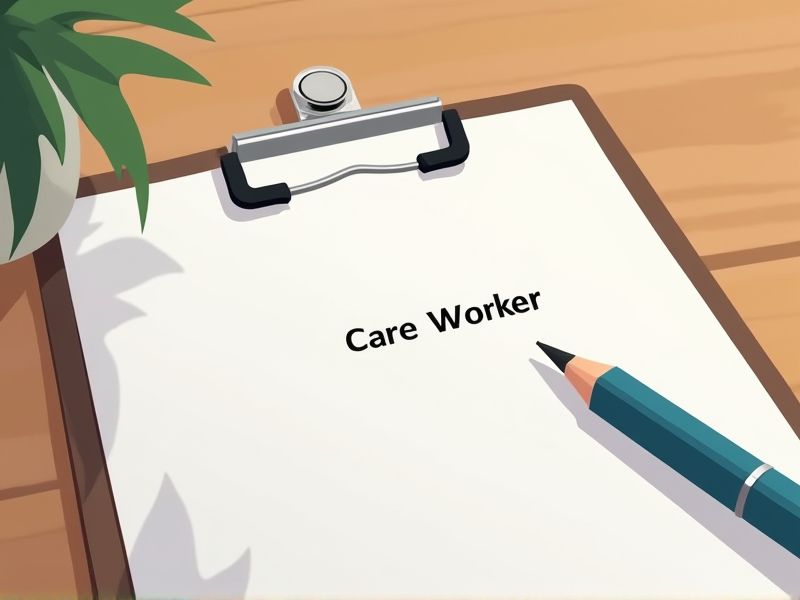
Older Persons Care Workers play a crucial role in providing quality care and ensuring the well-being of elderly individuals. Acquiring certain certifications enhances their skills and enables them to meet industry standards and safety regulations. These credentials help build trust with families and healthcare providers, underlining the worker's competence and reliability. Here are some important certifications you may need as an Older Persons Care Worker.
Certified Nursing Assistant (CNA)
The aging population leads to an increased demand for personal care, and CNAs fulfill this role by providing essential daily assistance to older adults. As healthcare providers prioritize holistic approaches, CNAs support not just physical needs but also contribute to emotional and social well-being. Given that older adults may face complex health conditions, CNAs offer crucial support in monitoring health changes and reporting them to healthcare teams. The need for cost-effective care solutions drives healthcare systems to utilize CNAs, who deliver vital services, helping to reduce the burden on family caregivers and the broader healthcare industry.
Home Health Aide (HHA) Certification
Holding a Home Health Aide (HHA) certification verifies that an older persons care worker has received proper training in essential skills, such as safety protocols and personal care. Government regulations often require this certification to ensure consistent standards of care across the industry. Employers are more likely to hire individuals with HHA certification as it reduces liability and improves service quality. Families seeking care for their older relatives often feel more confident and secure when the caregiver possesses an HHA certification.
CPR and First Aid Certification
Obtaining CPR and First Aid Certification equips older persons care workers with the essential skills to respond effectively to medical emergencies, reducing potential harm to the elderly. Since older adults may have pre-existing health conditions, certified workers can promptly manage situations like cardiac arrest or choking. The certification instills confidence and ensures that care workers can provide immediate assistance before professional medical services arrive. Employers often require this certification to meet regulatory standards and ensure the highest level of care in eldercare facilities.
Medication Administration Certification
Medication Administration Certification enables older persons care workers to properly administer medication, reducing the risk of dosing errors. It ensures caregivers understand potential drug interactions, safeguarding patients from harmful side effects. Certification provides standardized protocols, enhancing the quality of care and ensuring compliance with legal regulations. Trained caregivers contribute to a safer environment, fostering trust among families and medical professionals.
Dementia Care Certification
Dementia Care Certification equips care workers with specialized knowledge to manage the unique behavioral and cognitive challenges associated with dementia. This specialized training enhances the quality of care provided, reducing stress for both the caregiver and the patient. Certification helps ensure adherence to best practices, decreasing the risk of adverse events or care-related errors. Moreover, certified workers are often more trusted by families, promoting a sense of security and confidence in the care provided.
Gerontological Nursing Assistant Certification
Gerontological Nursing Assistant Certification equips care workers with specialized knowledge to address the unique health challenges faced by older adults, enhancing the quality of care provided. This certification often leads to improved patient outcomes, as professionals gain skills to manage age-related conditions effectively. Employers recognize certified staff as more competent, potentially leading to increased job opportunities and career advancement. Understanding geriatric needs through certification can reduce the risk of errors and ensure compliance with healthcare standards specific to elder care.
Palliative Care Certification
Palliative Care Certification equips older persons care workers with specialized skills to manage pain and alleviate suffering, directly enhancing the quality of life for elderly patients. Certified workers are better prepared to address the complex emotional, physical, and psychological needs of aging individuals, leading to improved patient outcomes. As the elderly population continues to grow, a higher demand for skilled care workers with palliative expertise ensures that resources are efficiently allocated. Certification also standardizes the level of care provided, fostering trust and reliability within healthcare systems for older adults.
Mental Health First Aid Certification
Older persons care workers frequently encounter elderly individuals who may face mental health challenges, such as depression or anxiety. Mental Health First Aid Certification equips these workers with the skills to recognize signs of distress and offer appropriate support. This training enhances the ability to respond effectively to mental health crises, potentially reducing the risk of severe outcomes. Improved mental health support leads to better overall well-being for older individuals, fostering a supportive care environment.
Elder Abuse Prevention Training Certification
Elder Abuse Prevention Training Certification equips care workers with skills to recognize and respond effectively to signs of abuse, ensuring the safety and wellbeing of older individuals. Older persons often rely heavily on caregivers, making them vulnerable to neglect and mistreatment, thus certification reinforces appropriate handling of specific situations. Data shows that certified caregivers tend to report abuse incidents more promptly, facilitating faster interventions and protection of older persons' rights. The certification also enhances care workers' credibility and trustworthiness, fostering a more respectful and empathetic care environment.
Infection Control Certification
Infection control certification ensures care workers understand and implement proper hygiene practices, reducing the risk of infections among older individuals whose immune systems may be weaker. Proper training leads to a safer environment by minimizing the spread of pathogens in care settings. Certification equips care workers with up-to-date knowledge on handling emerging infectious diseases effectively. It enhances the credibility of the care facility, promoting trust among families seeking safe environments for their loved ones.
Summary
When you ensure that older persons' care workers obtain certifications, you enhance the overall quality of care they provide. Workers with credentials typically have better training and skills, leading to improved patient outcomes. Certification often instills a sense of professionalism, motivating care workers to maintain higher standards. This background usually translates into stronger trust between the care worker, elderly individuals, and their families.
